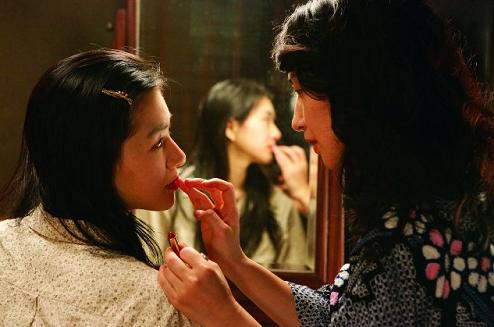aGLIFF Polari 2012 Dispatch: Talkin' Bout My Generations

My final screening at aGLIFF Polari had an irresistible title: "Talkin' Bout My Generations: Multi-Generational Shorts." Being a fan of short films and The Who, how could I resist this collection of shorts spanning every stage of life? And I'm happy to report that the films were invariably terrific and a great way to wrap up my festival experience.
The shorts collection opened with The Devotion Project: #1 -- More Than Ever, a documentary in which an elderly New York gay couple recounts their 54-year relationship. William Campbell and John Hilton hit the highlights of their years together, from their 1950s meeting at a bathhouse to John's conscription into the Army (obviously, he didn't tell) to their careers and old age, when John helps the ailing William, who speaks only in a whisper.
More Than Ever is dripping with poignancy, but it's never cloying. It's a solid piece of documentary filmmaking, one that demonstrates that no matter the stage of life, gay relationships are no different than their straight counterparts.
Following More Than Ever was Deflated, a look at a young boy's gender crisis. Left in a discount store to find a cheap toy while his father shops elsewhere, the boy encounters a giant basket filled with pink inflatable balls, along with a half-deflated green one. Torn between his preference for the color pink and society's expectation that he take the green ball, he suffers a gender identity crisis over something as simple as choosing a toy.
There isn't much to the 6-minute Deflated -- just a boy and some toys -- but it's an effective statement about the inner conflicts of those who question their gender identities. Carson Trinity Haverda steals the show as a boy probably destined for many years of struggling with his self image. The short was shot here in Austin.
Next up was Tsuyako (pictured above), the story of a young woman in postwar Japan who must choose between her duties as a wife and mother and her desire to live a totally different life in a lesbian relationship. By far my favorite of all the shorts, the visually and emotionally stunning Tsuyako is a powerful film with much to say about the fundamental human desire to be who we are and live as we please.
Tsuyako has won an amazing number of awards, and it's easy to see why: It's as good a short film as any I've seen, with an outstanding performance by Sachiko Katsumata as the titular character. Don't miss an opportunity to see this magnificent work by filmmaker Mitsuyo Miyazaki.
Following Tsuyako was the far less serious Alone with Mr. Carter, in which a pre-teen John (Robert Naylor) longs to express his love for his 65-year-old neighbor, Mr. Carter (Paul James Saunders). Set in 1997 -- not coincidentally, the year Ellen DeGeneres came out -- the film is a very funny examination of a young boy's battle with the double-whammy of impending adolescence and rampant homophobia.
Given its serious subject matter, Alone with Mr. Carter is a surprisingly upbeat film, portraying John's forbidden love like any other 10-year-old's crush. Naylor and Saunders are perfect as the two leads, and a surprising plot twist elevates the film beyond being just another boy-in-love story.
Unique in that it follows its characters from early childhood through old age, the Australian import Shopping is the story of two women who share a connection when they encounter each other on supermarket aisles at several stages in their lives. Their connection is obvious from their first meeting as toddlers riding in shopping carts, and even more so when they meet again as adults.
Like Deflated, the 7-minute Shopping is a simple film, but its message is every bit as important. I particularly liked the film's slightly dreamy look and feel, is if everything in the women's lives faded into the background whenever they crossed paths.
The final short was a clip from PJ Raval's work in progress, Untitled Gay Retiree Documentary. Best known as a highly respected cinematographer, Raval also has directed more than a dozen shorts and co-directed the documentary Trinidad. The 10-minute clip revealed that the film addresses a seldom-discussed subject: Many gay seniors are hesitant to move into retirement homes and assisted living facilities for fear of discrimination. The film explores the need for facilities that cater to the LGBT community, places where residents won't feel compelled to return to the closet after living openly gay lives for decades.
Obviously I can't review Raval's work until it's finished, but if the end result is as good as the clip (a series of interviews with elderly gay men), it should be an interesting documentary. In a Q&A after the screening, Raval said he found inspiration for the film after visiting one of America's few existing LGBT-oriented facilities, some of which are struggling to remain open. He hopes to finish the film next year and plans to screen it on the festival circuit. It also will air on PBS.

